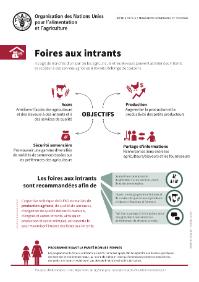Focal point
Location
The Food and Agriculture Organization of the United Nations leads international efforts to defeat hunger. Serving both developed and developing countries, FAO acts as a neutral forum where all nations meet as equals to negotiate agreements and debate policy. FAO is also a source of knowledge and information. We help developing countries and countries in transition modernize and improve agriculture, forestry and fisheries practices and ensure good nutrition for all. Since our founding in 1945, we have focused special attention on developing rural areas, home to 70 percent of the world's poor and hungry people.
Members:
Resources
Displaying 341 - 345 of 5073Country profile – Bangladesh
This country profile describes the state of the water resources and water use, as well as the state of agricultural water management in Bangladesh. The aim of this report is to describe the particularities of the country and the problems met in the development of the water resources, and irrigation in particular. Irrigation trends, existing policies and legislation to water use in agriculture, possible treaties and agreements between countries as well as prospects for water management in agriculture are presented, as described in literature.
FAO and Traditional Knowledge: The Linkages with Sustainability, Food Security and Climate Change Impacts
In developed and developing countries all over the world, farmers and indigenous and local communities have traditional knowledge, expertise, skills and practices related to food security and to food and agricultural production and diversity. Since its creation in 1945, FAO has recognized the significant contributions these make to food and agriculture, and the relevance of on-farm/in situ and ex situ conservation of genetic resources for food and agriculture.
FAO and Traditional Knowledge: The Linkages with Sustainability, Food Security and Climate Change Impacts
In developed and developing countries all over the world, farmers and indigenous and local communities have traditional knowledge, expertise, skills and practices related to food security and to food and agricultural production and diversity. Since its creation in 1945, FAO has recognized the significant contributions these make to food and agriculture, and the relevance of on-farm/in situ and ex situ conservation of genetic resources for food and agriculture.
FAO and Traditional Knowledge: The Linkages with Sustainability, Food Security and Climate Change Impacts
In developed and developing countries all over the world, farmers and indigenous and local communities have traditional knowledge, expertise, skills and practices related to food security and to food and agricultural production and diversity. Since its creation in 1945, FAO has recognized the significant contributions these make to food and agriculture, and the relevance of on-farm/in situ and ex situ conservation of genetic resources for food and agriculture.
Foires aux intrants
Breve description des modalités et avantages des programmes de Foires aux intrants









